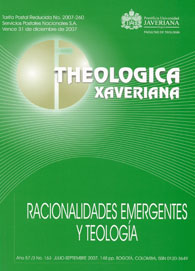Abstract
This paper centers on the elements that constitute critical thinking starting from the humanization of the human being in search of emancipation. The concepts of humanization and emancipation are elaborated from the starting point of a world conceived ever more as secular and at our disposal, where humanizing is freeing the human being of its bonds, and freedom is freedom from the bonds, therefore, critical thinking has to say what those bonds are. The paper proposes the development of a categorial frame for critical thinking or critical theory, centered on three elements: the ethic of emancipation, justice as guide of the emancipation process, and the relation between the subject and common good.
This journal is registered under a Creative Commons Attribution 4.0 International Public License. Thus, this work may be reproduced, distributed, and publicly shared in digital format, as long as the names of the authors and Pontificia Universidad Javeriana are acknowledged. Others are allowed to quote, adapt, transform, auto-archive, republish, and create based on this material, for any purpose (even commercial ones), provided the authorship is duly acknowledged, a link to the original work is provided, and it is specified if changes have been made. Pontificia Universidad Javeriana does not hold the rights of published works and the authors are solely responsible for the contents of their works; they keep the moral, intellectual, privacy, and publicity rights.
Approving the intervention of the work (review, copy-editing, translation, layout) and the following outreach, are granted through an use license and not through an assignment of rights. This means the journal and Pontificia Universidad Javeriana cannot be held responsible for any ethical malpractice by the authors. As a consequence of the protection granted by the use license, the journal is not required to publish recantations or modify information already published, unless the errata stems from the editorial management process. Publishing contents in this journal does not generate royalties for contributors.


